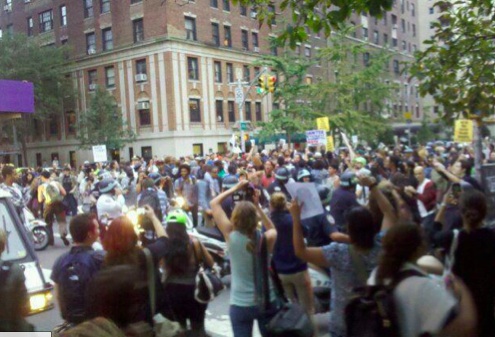Occupied by Wall Street...at Georgetown

One of my friends just returned from Wall St. He said that upon arrival he was full of inspiration. He knew he would make a difference. He would be one of the few people our age with the gall and the grit to have actually made it there. It was fun at first, he told me. Everything moved so fast. People actually took notice of his contribution. Optimism defined his early days. But the long hours balanced with no clear mission started to wear him down. He began to see himself as increasingly insignificant. He grew more and more disgusted by the culture of corporate greed and Washington’s capitulation. He also couldn’t stand how shallow the collective consciousness was of those around him. Eventually, he packed his bags and left. He summed it up grimly last Saturday night: “Really, man, don’t even bother applying for investment bank jobs. It’s just not worth it.” Many more of my friends still work on Wall Street, however. Some have cubicles at Goldman Sachs or Morgan Stanley or Deutsche Bank. Many more of my Georgetown peers will be joining them this year. I do not begrudge any of them for taking jobs on Wall Street. Indeed, if my GPA was higher and my analytical skills were in better shape, I would probably be headed to Wall Street too. Taking a job at an investment bank as a graduate of the class of 2012 is certainly an impressive accomplishment. Perhaps at no time in the history of the United States has there been a worse time to be in college. In December of 2007, the unemployment rate was just below 5%. When we graduate in 2012 – with a $200,000 diploma, and all the debt along with it – the unemployment rate will likely be just below 9%. Finding any job, especially a highly competitive and well-compensated one, is more than admirable. The brazen defenders of Wall Street however, are wrong to begrudge those who have actually joined the protests against Wall Street that emerged one month ago. While these protesters are not advocating specific, large-scale policy reforms, their angst is well founded. After all, as Paul Krugman recently recounted, it was these banks that exploited deregulation to inappropriately lend money. This, in turn, inflated bubbles that would eventually burst. This then led to a massive taxpayer bailout. Even after the taxpayers bailed out these Wall Street banks, the banks decided to charge taxpayers a surcharge for using a debit card – quite the “thank you.” The important thing to note about the Occupy Wall Street protests and the high-achieving college graduates who spend their career occupying Wall Street cubicles is that both reflect just how unreasonable our capitalism has become. One the one hand, you have a group of people who are entirely sick of Wall Street greed, the devastation it caused, and the Washington corruption that allowed it. On the other hand, you have a group of people aspiring to a great career, forced to work excessively and thankless long hours only to make a fraction of the money pulled in by their Robber Baron bosses. The tragedy is, too few people are realizing the moment in which we find ourselves. Protests, in today’s political culture, accomplish little, and can in fact even detract from the causes they try to serve. Playing in to the hands of the status quo however – by occupying Wall Street as an employee – only perpetuates the problem. Where does this leave us? In a month, I doubt many people will still be talking about the Occupy Wall Street protests. And I know that Georgetown will continue to serve as a feeder school to the firms who catalyzed the protests in the first place. It remains a shame, though, that the narratives told by both young bankers and by young protesters sound eerily the same.
Mike Meaney is President of the Georgetown University Students Association and a regular columnist of The Georgetown Dish.





